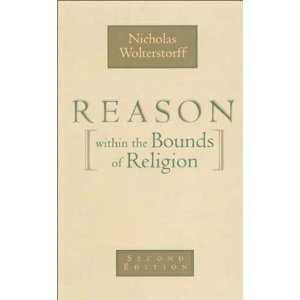When should a Christian reject Christianity?
The very fact that I ask that question means, for many, that I cannot be a “real” Christian. But for those for whom it doesn’t (or who are willing to hear me out), here’s what I’m thinking:
In 1984 Nicholas Wolterstorff penned a book about being a scholar and a Christian (gendered language duly noted). In it, he writes:
“For the Christian to undertake scholarship is to undertake a course of action that may lead him into the painful process of revising his actual Christian commitment, sorting through his beliefs and discarding some . . . It may, indeed, even lead him to a point where his authentic commitment has undergone change.” (Reason with the bounds of Religion, pp. 96 & 97).
Earlier he summarized his intention for the current chapter and contextualized the previous quotation:
“So far I have been pressing the point that the Christian in the practice of scholarship ought to let the belief-content of his authentic commitment function as control over his theory-weighing. My emphasis here is almost the opposite. Sometimes he should allow scientific developments to induce revisions in what he views as his authentic Christian commitments.” (p 94, his emphasis).
My focus here is the same as Wolterstorff’s: what one views as one’s authentic Christian commitment. In other words, what a Christian takes to be (and then presumably makes of) the content of his/her commitment to Christianity. However, my view is not that Wolterstorff’s idea is excessive, but that it is insufficient.
Specifically, Wolterstorff notes that “scientific developments” can bring revisions to one’s beliefs. I heartily agree. In essence he is concerned to ensure that our belief is authentic. Yet surely it is not only scientific developments but existential developments that prompt revisions to our beliefs? Are not both informers that we should consider?
My point is that certain existential developments (or a series of such) can not only make one doubt one’s beliefs but, under certain circumstances, should prompt one to revise one’s view of the authenticity of Christian belief. Murder, child abuse, and the deception and power-mongering by the clergy—or particularly, all of them combined—within one’s personal experience may, depending on one’s circumstances, paint the stark and undeniable picture that evil is more powerful (and more real) than the Christian God.
In general terms, it seems to me that where scientific developments can prompt revision of belief content, existential developments can additionally prompt revision of the very possibility of authenticity of the belief itself.
As such, “revising” may necessarily result in rejecting Christianity. Stated differently, none of us can hold that Christian belief is ultimately true, for we are contingent and finite. And if our best and most “authentic” resources point to the contrary, then sticking with Christian belief despite such makes us (at least) fools and liars.
My goal is not to castigate Christianity: I am a Christian. Nor do I believe that God is anaemic or merely an idea (as opposed to an entity). Nor, finally, do I believe that anything is more central to God’s character than truth and love.
Rather, I am concerned that in their efforts to encourage their fellow Christians to think through hard questions, these Christians would render their fellows less human. How so? Because despite our contingency, for Christians the only “unrevisable” revision is Christian belief itself. Yet in some cases, failing not only to accept but to encourage the disbelief (and even atheism) of others vis-à-vis their experience of this God or that Jesus–the central issue raised by the biblical prophets, that is, false religion–is tantamount to a betrayal of their very humanity.
In theological terms, denying our most authentic existential resources denigrates both our creatureliness and the biblical affirmation that creation is not only good but is good enough as a resource for all to help us decide how (and how much) God is good, is love, or just is.
Think about it this way:
Insofar as atheism claims to be the pursuit of truth relative to religion, and truth is quintessential to the Christian God, can there be a religious–and indeed, Christian–significance to atheism?


Yes! I agree.
Hi Philip,
Nice to hear from you. What particularly resonated with you?